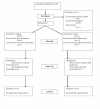Singing teaching as a therapy for chronic respiratory disease--a randomised controlled trial and qualitative evaluation
- PMID: 20682030
- PMCID: PMC2920262
- DOI: 10.1186/1471-2466-10-41
Singing teaching as a therapy for chronic respiratory disease--a randomised controlled trial and qualitative evaluation
Abstract
Background: Despite optimal pharmacological therapy and pulmonary rehabilitation, patients with COPD continue to be breathless. There is a need to develop additional strategies to alleviate symptoms. Learning to sing requires control of breathing and posture and might have benefits that translate into daily life.
Methods: To test this hypothesis we performed a randomised controlled trial, comparing a six week course of twice weekly singing classes to usual care, in 28 COPD patients. The experience of singing was assessed in a qualitative fashion, through interviews with a psychologist. In addition, we surveyed patients with chronic respiratory conditions who participated in a series of open singing workshops.
Results: In the RCT, the physical component score of the SF36 improved in the singers (n = 15) compared to the controls (n = 13); +7.5(14.6) vs. -3.8(8.4) p = 0.02. Singers also had a significant fall in HAD anxiety score; -1.1(2.7) vs. +0.8(1.7) p = 0.03. Singing did not improve single breath counting, breath hold time or shuttle walk distance. In the qualitative element, 8 patients from the singing group were interviewed. Positive effects on physical sensation, general well-being, community/social support and achievement/efficacy emerged as common themes. 150 participants in open workshops completed a questionnaire. 96% rated the workshops as "very enjoyable" and 98% thought the workshop had taught them something about breathing in a different way. 81% of attendees felt a "marked physical difference" after the workshop.
Conclusion: Singing classes can improve quality of life measures and anxiety and are viewed as a very positive experience by patients with respiratory disease; no adverse consequences of participation were observed.
Trial registration: Current Controlled Trials--ISRCTN17544114.
Similar articles
-
Community singing groups for people with chronic obstructive pulmonary disease: participant perspectives.Perspect Public Health. 2018 Jan;138(1):66-75. doi: 10.1177/1757913917740930. Epub 2017 Nov 21. Perspect Public Health. 2018. PMID: 29160737
-
Singing classes for chronic obstructive pulmonary disease: a randomized controlled trial.BMC Pulm Med. 2012 Nov 13;12:69. doi: 10.1186/1471-2466-12-69. BMC Pulm Med. 2012. PMID: 23145504 Free PMC article. Clinical Trial.
-
Singing for lung health in COPD: a multicentre randomised controlled trial of online delivery.BMJ Open Respir Res. 2024 May 2;11(1):e002365. doi: 10.1136/bmjresp-2024-002365. BMJ Open Respir Res. 2024. PMID: 38697677 Free PMC article. Clinical Trial.
-
Effects of Home-Based Breathing Exercises in Subjects With COPD.Respir Care. 2020 Mar;65(3):377-387. doi: 10.4187/respcare.07121. Epub 2019 Nov 12. Respir Care. 2020. PMID: 31719191 Review.
-
Role of music in the management of chronic obstructive pulmonary disease (COPD): a literature review.Technol Health Care. 2014;22(1):53-61. doi: 10.3233/THC-130773. Technol Health Care. 2014. PMID: 24398814 Review.
Cited by
-
Long-term self-reported attendance in exercise training or lung choir and status of quality of life following initial pulmonary rehabilitation for COPD.Front Rehabil Sci. 2024 Sep 19;5:1447765. doi: 10.3389/fresc.2024.1447765. eCollection 2024. Front Rehabil Sci. 2024. PMID: 39363990 Free PMC article.
-
Effects of Breathing Exercises in Patients With Chronic Obstructive Pulmonary Disease: Systematic Review and Meta-Analysis.Ann Rehabil Med. 2019 Aug;43(4):509-523. doi: 10.5535/arm.2019.43.4.509. Epub 2019 Aug 31. Ann Rehabil Med. 2019. PMID: 31499605 Free PMC article.
-
Singing Interventions in Pulmonary Rehabilitation: A Scoping Review.Int J Environ Res Public Health. 2023 Jan 12;20(2):1383. doi: 10.3390/ijerph20021383. Int J Environ Res Public Health. 2023. PMID: 36674142 Free PMC article.
-
Is group singing special? Health, well-being and social bonds in community-based adult education classes.J Community Appl Soc Psychol. 2016 Nov/Dec;26(6):518-533. doi: 10.1002/casp.2278. Epub 2016 Jul 17. J Community Appl Soc Psychol. 2016. PMID: 27867282 Free PMC article.
-
Moving singing for lung health online in response to COVID-19: experience from a randomised controlled trial.BMJ Open Respir Res. 2020 Nov;7(1):e000737. doi: 10.1136/bmjresp-2020-000737. BMJ Open Respir Res. 2020. PMID: 33239406 Free PMC article. Clinical Trial.
References
-
- O'Donnell DE, Bertley JC, Chau LK, Webb KA. Qualitative aspects of exertional breathlessness in chronic airflow limitation: pathophysiologic mechanisms. Am J Respir Crit Care Med. 1997;155:109–115. - PubMed
-
- Bausewein C, Booth S, Gysels M, Higginson I. Non-pharmacological interventions for breathlessness in advanced stages of malignant and non-malignant diseases. Cochrane Database Syst Rev. 2008. p. CD005623. - PubMed
Publication types
MeSH terms
Associated data
LinkOut - more resources
Full Text Sources
Other Literature Sources
Medical


